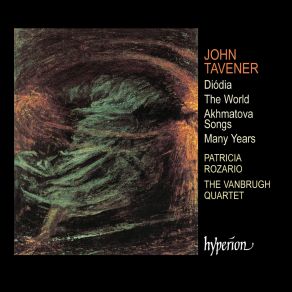Tavener: The World & Diódia / Tavener: The World & Diodia
Download links and information about Tavener: The World & Diódia / Tavener: The World & Diodia by Patricia Rozario, RTÉ Vanbrugh Quartet / RTE Vanbrugh Quartet. This album was released in 2001 and it belongs to genres. It contains 15 tracks with total duration of 01:02:20 minutes.

|
|
|---|---|
| Artist: | Patricia Rozario, RTÉ Vanbrugh Quartet / RTE Vanbrugh Quartet |
| Release date: | 2001 |
| Genre: | |
| Tracks: | 15 |
| Duration: | 01:02:20 |
| Buy it NOW at: | |
| Buy on iTunes $9.99 | |
Tracks
[Edit]| No. | Title | Length |
|---|---|---|
| 1. | The World | 10:09 |
| 2. | Diódia, "String Quartet No. 3": I. Solemn | 5:51 |
| 3. | Diódia, "String Quartet No. 3": II. [Rehearsal Letter I] | 4:54 |
| 4. | Diódia, "String Quartet No. 3": III. Solemn and Radiant | 4:44 |
| 5. | Diódia, "String Quartet No. 3": IV. [Rehearsal Letter Z] | 4:51 |
| 6. | Diódia, "String Quartet No. 3": V. [Rehearsal Letter G1] | 4:31 |
| 7. | Diódia, "String Quartet No. 3": VI. [Rehearsal Letter M1] | 4:38 |
| 8. | Diódia, "String Quartet No. 3": VII. [Rehearsal Letter S1] | 4:38 |
| 9. | Many Years | 3:20 |
| 10. | Akhmatova Songs: I. Dante | 2:17 |
| 11. | Akhmatova Songs: II. Pushkin and Lermontov | 1:54 |
| 12. | Akhmatova Songs: III. Boris Pasternak | 1:40 |
| 13. | Akhmatova Songs: IV. Dvustishie "Couplet" | 2:11 |
| 14. | Akhmatova Songs: V. Muza "The Muse" | 2:50 |
| 15. | Akhmatova Songs: VI. Smert "Death" | 3:52 |
Details
[Edit]Nearly four years after the death of and funeral for Princess Diana, where composer John Tavener's "Song for Athene" was performed by Patricia Rozario, Tavener is a popular British celebrity and arguably that country's most well-known composer whose every work is given deferential attention and intense scrutiny by critics. These four chamber works — three of them for soprano and string quartet — are among the most accessible and provocative of Tavener's later works. They employ themes that seem to preoccupy his compositions — especially those for vocalists. His direct employ of methods of composition from the Byzantine chant, Orthodox polyphony, and the use of isons (drone-like sustained notes, within which the pitch can bend in a single bar) can present challenges for untrained. Rozario is, however, trained in the mannerisms and methodology of Tavener's work. First up is "The World." The piece comes from a poem by the poet Kathleen Raine, and Tavener claims to have been moved by its "mantra-like quality." The setting is one of intensity, extremely loud then soft, extremely hot, then cold, and almost unbearable; but it is anything but. As Rozario effortlessly bends pitches in the work with her voice, the Vanbrugh Quartet careen and glide through Eastern and Western scales, and the combination of Sufi modalities and Eastern liturgical music, a mosaic is created that opens up an interior world where void and substance are shadow sides to one another and the beauty of the work is what becomes nearly unbearable as it walks from interior to exterior world and into another space entirely, one that is beyond the realm of earthly language to describe. This work is followed by a 34-minute string quartet, "Di?dia" (Toll Houses). This third major string quartet from Tavener has as its theme the different purgatorial (or, in Buddhist terms, "bardo") states of the soul after death. In seven movements, the work moves from a microtonal universe of drones and long, extended tones to fiery and even ferocious "exspressivo" passages. Intensity is, not unlike the romantics, something that grows until the tension is so utterly visible, it must resolve itself or implode. Tavener's work does both. The compositions here include the six "Akhmatova Songs," named after the great Russian poet, sung heartbreakingly beautifully by Rozario; music is merely a canvas for her expression and vocal prowess here. She conveys the text as if it were tattooed on her own heart. And Tavener's musical rigors for such a small group are extensive, Eastern and Western notions of harmony and pitch, rhythm and meter, all colliding with these short songs, which are performed flawlessly. And finally, "Many Years," written for the 50th birthday of Prince Charles, touches perhaps his heart for its text. What is moving is Rozario's singing (she could make a person cry singing a soap commercial, such is her talent). The string quartet is in pastoral mode, sleeping through the only dud on an otherwise perfect recording.